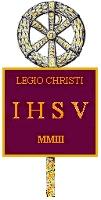 IN HOC SIGNO VINCES |
An Ancient Form |
 TIME DEUM ET OPERARE IUSTITIAM |
 IN HOC SIGNO VINCES |
An Ancient Form |
 TIME DEUM ET OPERARE IUSTITIAM |
The Agape or love feast was conducted by early Christians from the earliest times. This is a form which a cohort might use in the evening. This form is derived from that of Hippolytus of Rome in about 215AD in the treatise "Apostolic Traditions". The form in paraphrased from a translation by Kevin Edgecomb: http://www.bombaxo.com/hippolytus.html
In the evening, the deacon will bring in a lighted lamp before the bishop. The bishop, or other minister will stand in the congregation of the faithful and shall say,
Bishop: "The Lord be with you."
People: "And with your spirit."
Bishop: "Let us give thanks unto the Lord."
People: "It is meet and right so to do; greatness and exaltation and glory are his due."
Bishop: "We thank you, O God, through your Son Jesus Christ our Lord, for you have brought us into light by showing us the light that is not corruptible. We have ended the whole of a day, and have arrived at the beginning of this night. We have been satisfied with the light of the day that you have made for our satisfaction, and since we now do not lack a light for the evening by your grace, we sanctify you and glorify you, through your only Son Jesus Christ our Lord, through whom to you with him be glory and might and honor with the Holy Spirit, now and always, and throughout the ages of the ages.
People and Bishop: AMEN
The Deacon shall hold a mixed cup of wine and say or sing a psalm from among those in which is written "Alleluia." Then, if the elder orders it, more shall be sung from the same psalms. After this, the bishop shall offer the cup, saying or singing one of those psalms that are used for the cup, all will include "Alleluia". The people shall say, "Alleluia," which means, "We praise God. Glory and praise to him who created the world by his word !" When the psalm is completed, minister shall bless the cup and give of the pieces of bread to all the faithful ones.
In the dinner, the faithful who are present will take a small piece of bread from the hand of the bishop, before they take their own bread because it is blessed. This however is not the eucharisted bread like the body of the Lord. Likewise, before drinking, they will hold their cups and offer thanks for them. They will eat and drink purely. But the catechumens will get exorcised bread and cups because the catechumen may not take the Lord's Supper. All should eat and drink in moderation. Do not drink to get drunk so that nobody will mock you, and so that your host will not be grieved by your disorderly conduct... In eating, eat what you need but not in excess, so that the host may have some left over that to send to the saints to their rejoicing.
Let the guests eat in silence, without arguing, saying only what the bishop allows. If someone asks a question, it shall be answered. When the bishop answers, all shall remain silent, praising him modestly, until someone else asks a question.
And if, in the absence of the bishop, the faithful attend the meal in the presence of an elder or a deacon, they shall eat in the same way, honorably. Everyone shall be careful to receive the blessed bread and from the hand of the elder or deacon. Similarly, the catechumen will still receive exorcised.
If laypeople only are gathered, they shall behave modestly, for a layperson cannot make the blessed bread.
Each shall eat in the Name of the Lord. For this is pleasing to God that we should show ourselves as zealots even among the pagans, all of us being unified and sober.
Whenever someone wishes to invite older widows to a meal, he shall send them away before sunset. If he cannot receive them in his own home due to his ecclesiastical office, he shall give them food and wine and send them away. Then they may eat it at home as they please.
All shall be diligent to offer to the bishop the firstfruits of the fruits of the first harvest.
He shall bless them, saying,
"We give thanks to you, God, and offer to you the firstfruits of the fruits which you have given to us as food, having nourished them by your word, commanding the earth to bring forth all kinds of fruit for the pleasure and nourishment of men and all animals. For all this we praise you, God, in which you have been our benefactor, adorning all creation for us with various fruits, through your Son Jesus Christ our Lord, through whom to you be glory throughout the ages of the ages. Amen."
These are the fruits which he shall bless: the grape, fig, pomegranate, olive, pear, apple, blackberry, peach, cherry, almond, and plum. But not the pumpkin, melon, cucumber, onion, garlic, or any other vegetable.
Sometimes flowers also are offered. The rose and lily may be offered, but no other flowers.
With all foods, give thanks to the Holy God, eating them to his glory.
Copyright 2003-2014
The Order of Centurions | www.orderofcenturions.org | 8/1/2004